|
 Secure Site
Secure Site
|
 |
Archive for the 'Bamboo Chime Clocks' Category
 Waking up in the morning should be as pleasant as falling asleep at night. The Zen Alarm Clock's gradual, gentle awakening is transformative. Zen meditation appears to reduce sensitivity to moderate pain when practiced by well-trained individuals, Canadian researchers report.
“Previous studies had already shown that teaching patients with chronic pain to meditate seemed to help them, but no one had examined how these effects might come about,” said study author Joshua A. Grant, a researcher in the department of physiology at the University of Montreal. “We reasoned that the best approach would be to study healthy people with a lot of meditation training already under their belts, because effects would presumably be strongest in them.”
“The first finding then is that the meditators are much less sensitive to heat pain,” noted Grant. “We [also] found that this pain reduction in meditators was related to how many lifetime hours of practice they had accumulated, with more pain reduction in the more senior practitioners.”
Throughout the experiments, the researchers also found that meditators seem to breath much more slowly than non-meditators — providing some of the first hard proof that the cardio-respiratory system could be the underlying mechanism by which meditation promotes pain control.
Grant and his University of Montreal co-author, Dr. Pierre Rainville, report the findings in the January issue of Psychosomatic Medicine.
According to the U.S. National Institutes of Health’s National Center for Complementary and Alternative Medicine (NCCAM), the practice of meditation refers to a wide range of techniques that harness a controlled focus on objects, words, breath, or posture to invoke relaxation, calmness, psychological balance, overall wellness, and/or disease control.
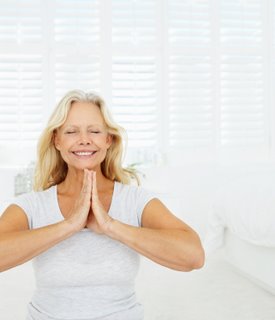 Wake up with gradual, beautiful acoustic chimes. The Zen Alarm Clock transforms your mornings and gets you started right, with a progressive awakening Regardless of the approach, NCCAM highlights four attributes that are common to most forms of stand-alone meditation or meditation performed in conjunction with other disciplines such as yoga, tai chi, or qi gong: finding a quiet space; engaging in a comfortable (but specifically prescribed) posture; focusing; and maintaining an “open attitude” towards the flow of thought and distractions.
Grant and Rainville’s study focused on the effects of Zen meditation. In essence, this technique is described as a “mindfulness-based practice” with historic roots in Buddhism, which calls for directing one’s attention to one’s inner as well as outer environment.
Thirteen Zen meditators, all of whom had already logged more than 1,000 hours of practice with the technique, were enrolled in the study. Between the spring and winter of 2006 the authors compared the practitioners’ reactions to moderate pain to that of 13 men and women of similar age with no meditation or yoga background.
Using high-tech thermal probes, the researchers exposed the left calf area of each participant to a series of painful and non-painful heated “stimulations” ranging from 37º C (neutral) to 43º C (warm and non-painful) to a maximum of 53º C (hot and moderately painful).
During each session, participants were either instructed to keep their eyes closed and not fall asleep; to shut their eyes and focus their attention on the left leg stimulation; or to close their eyes, focus on the left leg, and try not to judge the stimulation but instead merely observe the sensation moment-to-moment.
Based on self-reported pain levels, Grant and Rainville found that the last concentration exercise, designed to simulate meditation “mindfulness,” helped the meditators experience less pain, but had no impact on non-meditators.
Non-meditators were also not helped when they were told to focus on the leg stimulation. In fact, both the intensity of their pain and pain “unpleasantness” went up by 15 percent and 21 percent, respectively. In contrast, meditators given the same instruction experienced no increase on either score.
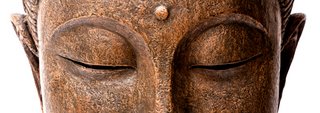 Having a refreshed mind and body are two keys to a natural and Zen lifestyle. “I think this study gives credibility to the stories often heard about certain individuals sitting through painful medical or dental procedures, for example, without anesthetic, relying on hypnosis or highly focused concentration to get them through the pain,” Grant said. “I’m not suggesting that if you practice Zen meditation you will never need apainkiller. But slowly, through studies like this and those on hypnosis, we’re understanding that we have perhaps a lot more control over aspects of our experience than we previously believed. Having this attitude of optimism is important, both to cultivate one’s own potential and to generate interest and support in understanding it scientifically.”
Dr. Herbert Benson, director emeritus of the Benson-Henry Institute for Mind-Body Medicine at Massachusetts General Hospital, described the study as “tremendously important” and as “another brick in the foundation” supporting mind-body approaches to pain control.
 The Zen Alarm Clock can effect your awareness in a variety of positive ways, all of which require your participation. “Stress is responsible for upwards of 60 to 90 percent of visits to doctors,” said Benson, who is also associate professor of medicine at Harvard Medical School. “So, to point to meditation as a means to evoke a relaxation response that could enable the mind to control pain isn’t that far of a leap.”
He noted that prior studies have suggested that various meditative techniques help release pain-relieving endorphins. “So this study is a nice addition to already existing literature,” Benson said. “And it suggests that what we have here is a relatively effective inexpensive approach that could help treat conditions that are being poorly treated by drugs and surgeries.”
Although meditation can be done in almost any context, practitioners usually employ a quiet, tranquil space, a meditation cushion or bench, and some kind of timing device to time the meditation session. Ideally, the more these accoutrements can be integrated the better. Thus, it is conducive to a satisfying meditation practice to have a timer or clock that is tranquil and beautiful. Using a kitchen timer or beeper watch is less than ideal.
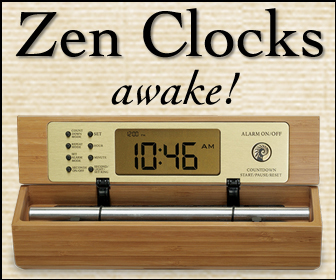 It's exquisite sounds summon your consciousness out of your meditative state with a series of subtle gongs. Once you experience the Zen Timepiece's progressive tones, you'll never want to meditate any other way.
And it was with these considerations in mind that we designed our digital Zen Alarm Clock and practice timer. This unique “Zen Clock” features a long-resonating acoustic chime that brings the meditation session to a gradual close, preserving the environment of stillness while also acting as an effective time signal. The Digital Zen Clock can be programmed to chime at the end of the meditation session or periodically throughout the session as a kind of sonic yantra. The beauty and functionality of the Zen Clock/Timer makes it a meditation tool that can actually help you “make time” for meditation in your life.
More information
There’s more on the health benefits of meditation at the U.S. National Center for Complementary and Alternative Medicine.
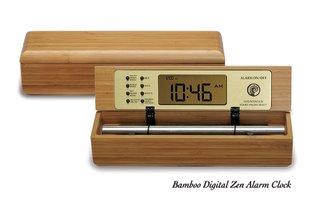 Use our unique "Zen Clock" which functions as a Yoga Timer. It features a long-resonating acoustic chime that brings your meditation or yoga session to a gradual close, preserving the environment of stillness while also acting as an effective time signal. Now & Zen – The Meditation Timer Store with Bowl Gongs
1638 Pearl Street
Boulder, CO 80302
(800) 779-6383
Orders@now-zen.com
Posted in Bamboo Chime Clocks
 The beauty and functionality of the Zen Clock/Timer makes it a meditation tool that can actually help you "make time" for meditation in your life. “Attentional-blink” occurs when two pieces of information are presented to a person in very close succession, and the brain doesn’t perceive the second piece of information because it is still processing the first. Richard Davidson and colleagues attempted to determine if intensive mental training through meditation could extend the brain’s limits on information processing, reducing “attentional-blink.”
The researchers compared two groups of people—17 expert meditators and 23 novices—to see if either was better at recognizing two pieces of information shown in quick succession.
The participants were tested at the beginning and end of a 3-month period. For the intervening 3 months, the meditation practitioners participated in a retreat, during which they meditated for 10-12 hours a day. The novices participated in a 1-hour meditation class, and were asked to meditate for 20 minutes a day for the week before each test.
The researchers found that intensive training did reduce “attentional-blink.” The participants who had gone through the mental training were more likely to perceive both pieces of information instead of just the first because the brain used fewer resources to detect the first piece of information—leaving more resources available to detect the second. The researchers also note that this study supports the idea that brain plasticity, or the ability of the brain to adapt, exists throughout life.
Use our unique “Zen Clock” which functions as a Yoga & Meditation Timer. It features a long-resonating acoustic chime that brings your meditation or yoga session to a gradual close, preserving the environment of stillness while also acting as an effective time signal. Our Yoga Timer & Clock can be programmed to chime at the end of the meditation or yoga session or periodically throughout the session as a kind of sonic yantra. The beauty and functionality of the Zen Clock/Timer makes it a meditation tool that can actually help you “make time” for meditation in your life. Bring yourself back to balance.
 The beauty and functionality of the Zen Clock/Timer makes it a meditation tool that can actually help you "make time" for meditation in your life. Bring yourself back to balance. adapted from National Center for Complementary and Alternative Medicine
 - “Mindfulness” is the spiritual practice of being aware of your present moment.
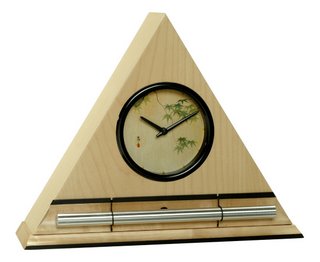 It features a long-resonating acoustic chime that brings your meditation or yoga session to a gradual close, preserving the environment of stillness while also acting as an effective time signal. Now & Zen
1638 Pearl Street
Boulder, CO 80302
(800) 779-6383
orders@now-zen.com
Posted in Bamboo Chime Clocks, Meditation Timers, Meditation Tools, mindfulness practice
 Use our unique "Zen Clock" which functions as a Yoga Timer. Relaxation Response: The relaxation response is a physical state of deep rest that changes the physical and emotional responses to stress (e.g., decrease in heart rate, blood pressure, and muscle tension). This technique is used by the Mind/Body Medical Institute in Chestnut Hill, Mass.
The technique involves sitting in a comfortable position and repeating a word, sound, phrase, prayer or muscular activity while passively disregarding the everyday thoughts that come into the mind so the practitioner can focus on the object of repetition. The institute suggests doing the response for 10 to 20 minutes at a time.
Transcendental Meditation: Popularized in the West by the Maharishi Mahesh Yogi, transcendental meditation involves sitting comfortably with the eyes closed for about 15 to 20 minutes, allowing the practitioner’s mind to enter a deeply relaxed state referred to as “Transcendental Consciousness.” The Maharishi Vedic Education Development Corp., which promotes the study of transcendental meditation, says the practice can increase a person’s creativity and productivity, improve health and reduce violence, among other benefits.
Yoga: A series of physical postures that connect the movement of the body with the breath. The poses are designed to purify the body, increase flexibility, calm the mind and provide physical strength and stamina required for long periods of meditation. There are many different kinds of yoga that range from more relaxing to more physically demanding, so people interested in practicing should find out beforehand what style of yoga is best for them.
Writing it Down: One technique recommended by Rabin involves taking 15 minutes to write down everything that’s bothering you. Don’t read what you’re writing or take time to proofread it, just write everything down, says Rabin. At the end of the 15 minutes, simply rip up the paper and throw it away. “It’s amazing the calming effect” this technique has, he says.
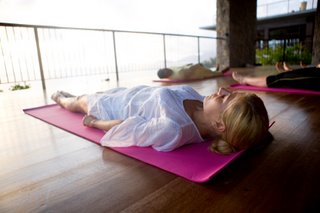 The beauty and functionality of the Zen Clock/Timer makes it a meditation tool that can actually help you "make time" for meditation in your life. Use our unique “Zen Clock” which functions as a Yoga & Meditation Timer. It features a long-resonating acoustic chime that brings your meditation or yoga session to a gradual close, preserving the environment of stillness while also acting as an effective time signal. Our Yoga Timer & Clock can be programmed to chime at the end of the meditation or yoga session or periodically throughout the session as a kind of sonic yantra. The beauty and functionality of the Zen Clock/Timer makes it a meditation tool that can actually help you “make time” for meditation in your life. Bring yourself back to balance.
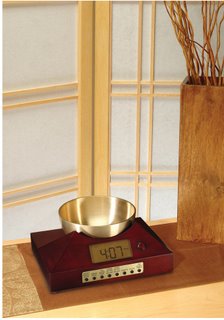 It features a long-resonating acoustic chime that brings your meditation or yoga session to a gradual close, preserving the environment of stillness while also acting as an effective time signal. Now & Zen – The Bowl/Gong Meditation Timer
1638 Pearl Street
Boulder, CO 80302
(800) 779-6383
orders@now-zen.com
Posted in Bamboo Chime Clocks, Meditation Timers, Meditation Tools, mindfulness practice
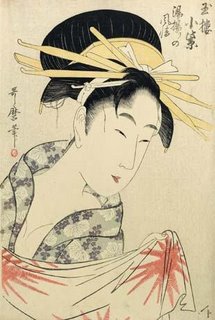 Kitagawa Utamaro, Komuraski of the Tamaya, House After a Bath, 1795 On June 22, I was invited to participate on National Public Radio’s The Diane Rehm Show along with Dr. Richard Davidson, NCCAM grantee at the University of Wisconsin-Madison, and Mr. Jonathon Foust, founder of the Mindfulness Training Institute in Washington, D.C. The topic was “The Power of Meditation.”
Meditation can take a variety of forms: mantra meditation, relaxation response, mindfulness meditation, Transcendental Meditation, and Zen Buddhist meditation, among others. Yoga and Tai chi also incorporate meditative components. Meditation practices are often rooted in spiritual practices, but many people practice meditation outside of a religious context. The 2007 National Health Interview Survey revealed that some 20 million U.S. adults use meditation for health purposes.
Meditation has been used for centuries to increase calmness and physical relaxation, improve psychological balance, cope with illness, and enhance overall health and well-being. The literature on meditation suggests that it is a very powerful tool for learning control of attention, regulating emotion, and increasing self-awareness or cultivation of the state called mindfulness. These insights are old. But what is new in the last 15 years or so is scientific data. These data show that during meditation there are a number of measurable biological changes—for example, in the autonomic nervous system—and the recognition that meditation has the potential to impact on mental and physical health. This is an area of scientific promise in mind-body medicine that NCCAM is supporting and welcoming continued exploration by our grantees.
There are many interesting challenges related to bringing science to the study of meditation. Modern neuroscience has increased the tools available for this research. It is now well established that the meditative state can be associated with changes in electrical function of the brain, and recent imaging studies suggest that there may actually be neuroanatomic changes as well. In particular, Dr. Davidson’s work on the effect of meditation on processing of attention and neuroplasticity is fascinating, as is hisexamination of meditation on immune and brain function. Challenges to this area of research include understanding how to set up adequate control and understanding the factors that determine how people actually incorporate the practice of meditation into their daily lives. These are study design challenges that need to be met so we may further explore the potential health benefits of this intriguing ancient human practice.
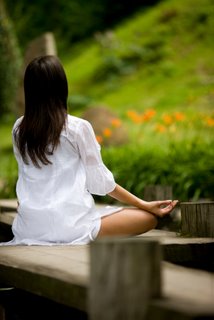 The beauty and functionality of the Zen Clock/Timer makes it a meditation tool that can actually help you "make time" for meditation in your life.
adapted from National Center for Complementary and Alternative Medicine by Dr. Josephine P. Briggs
Meditation is generally an inwardly oriented, personal practice, which individuals do by themselves. Meditation may involve invoking or cultivating a feeling or internal state, such as compassion, or attending to a specific focal point. The term can refer to the state itself, as well as to practices or techniques employed to cultivate the state. There are dozens of specific styles of meditation practice; the word meditation may carry different meanings in different contexts. Meditation has been practiced since antiquity as a component of numerous religious traditions. A 2007 study by the U.S. government found that nearly 9.4% of U.S. adults (over 20 million) had practiced meditation within the past 12 months, up from 7.6% (more than 15 million people) in 2002.
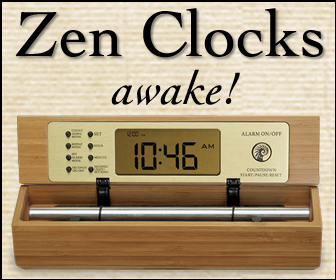 It's exquisite sounds summon your consciousness out of your meditative state with a series of subtle gongs.
Although meditation can be done in almost any context, practitioners usually employ a quiet, tranquil space, a meditation cushion or bench, and some kind of timing device to time the meditation session. Ideally, the more these accoutrements can be integrated the better. Thus, it is conducive to a satisfying meditation practice to have a timer or clock that is tranquil and beautiful. Using a kitchen timer or beeper watch is less than ideal. And it was with these considerations in mind that we designed our digital Zen Alarm Clock and practice timer. This unique “Zen Clock” features a long-resonating acoustic chime that brings the meditation session to a gradual close, preserving the environment of stillness while also acting as an effective time signal. The Digital Zen Clock can be programmed to chime at the end of the meditation session or periodically throughout the session as a kind of sonic yantra. The beauty and functionality of the Zen Clock/Timer makes it a meditation tool that can actually help you “make time” for meditation in your life.
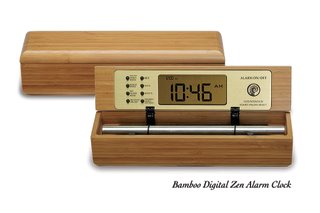 Our Yoga Timer & Clock can be programmed to chime at the end of the meditation or yoga session or periodically throughout the session as a kind of sonic yantra. The beauty and functionality of the Zen Clock/Timer makes it a meditation tool that can actually help you "make time" for meditation in your life. Bring yourself back to balance.
Now & Zen – The Meditation Timer Shop
1638 Pearl Street
Boulder, CO 80302
(800) 779-6383
Orders@now-zen.com
Posted in Bamboo Chime Clocks, Meditation Timers, Meditation Tools, mindfulness practice
 Wake up refreshed, love your alarm clock, transform your mornings with The Zen Alarm Clock's progressive awakening with gentle chimes. When faced with stressful situations, older adults who sleep poorly showed increased levels of a marker associated with inflammation, a new study finds.
The marker, called interleukin-6 (IL-6), has been linked to a variety of health issues, such as cardiovascular disease, diabetes and psychiatric problems.
“Our study suggests that, for healthy people, it all comes down to sleep and what poor sleep may be doing to our physiological stress response, our fight-or-flight response,” study author Kathi Heffner, an assistant professor of psychiatry at University of Rochester Medical Center in New York, said in a center news release.
The study was released online in advance of publication in an upcoming print issue of the American Journal of Geriatric Psychiatry.
The study included 45 women and 38 men with an average age of 61. Though all of the participants were in good health overall, about 27 percent were poor sleepers. Compared with good sleepers, those who slept poorly reported more depressive symptoms, more loneliness and more general stress.
At the start of the study, levels of IL-6 didn’t differ between poor sleepers and good sleepers. However, when put through a battery of verbal and memory tests intended to stress them out, poor sleepers’ levels of IL-6 spiked higher than that of the good sleepers.
The researchers concluded that older people who do not get adequate sleep may be at greater risk for mental and physical health problems because poor sleep changes how the immune system responds to stress, resulting in increased inflammation.
“This study offers more evidence that better sleep not only can improve overall well-being but also may help prevent poor physiological and psychological outcomes associated with inflammation,” Heffner said.
 Wake up with gradual, beautiful acoustic chimes. The Zen Alarm Clock transforms your mornings and gets you started right, with a progressive awakening Although a gradual decline in the immune system is a normal part of aging, the study authors concluded that treating sleep disorders among older adults could help prevent certain illnesses.
“There are a lot of sleep problems among older adults,” Heffner concluded. “Older adults do not have to sleep poorly. We can intervene on sleep problems in older adulthood. Helping an elderly person become a better sleeper may reduce the risk of poor outcomes associated with inflammation.”
Just Say No to a Snooze Button
Most modern alarm clocks include a “snooze button” mechanism which allows the user to go back to sleep for a brief period after the initial alarm.
While this may make it easier for some people to “face the day,” here at Now & Zen we feel the whole concept of a snooze button is “all wrong.”
People want snooze buttons because they want to awaken gradually. And this is only natural because just as our bodies fall asleep gradually, our bodies also want to wake up gradually. However, with a regular, snooze button-equipped alarm clock the user is initially “startled awake” by the alarm, and then continually startled awake with each press of the snooze button. This is not the way to treat your body because it creates a kind of merry-go-round of multiple “rude awakenings.”
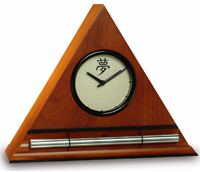 The Zen Alarm Clock transforms mornings, awakening you gradually with a series of gentle acoustic chimes Once you use a Zen Clock nothing else will do As an alternative we recommend using our Zen Alarm Clock, which wakes users gradually with a built-in 10 minute progression of gradually increasing acoustic chimes. It really is a better way to get up in the morning. Zen Alarm Clocks make waking up a beautiful experience. And once you experience the Zen Clock’s gradual 10 minute chime progression, you will never want to wake up any other way again.
More information
The U.S. National Institute of Neurological Disorders and Stroke has more about understanding sleep.
– Mary Elizabeth Dallas
SOURCE: University of Rochester Medical Center, news release, March 1, 2012
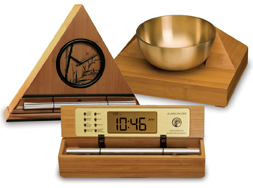 Wake up with gradual, beautiful acoustic chimes. The Zen Alarm Clock transforms your mornings and gets you started right, with a progressive awakening Now & Zen – Alarm Clocks with Gentle Sounds
1638 Pearl Street
Boulder, CO 80302
(800) 779-6383
orders@now-zen.com
Posted in Bamboo Chime Clocks
 the zen of air travel
By AYLIN ZAFAR
The San Francisco International Airport continues its quest to make itself its own destination. The airport has just opened a yoga room for harried travelers seeking a moment of peace following airport security.
In Terminal 2, serving Virgin America and American Airlines passengers, SFO’s “Zen Room” is reportedly the first of its kind. The space features dimmed lights meant to soothe weary spirits, a glass wall and door to act as a sound barrier from the busy noises of the terminal, and felt-covered rocks to add to the Zen garden atmosphere. The room will have plenty of yoga mats for travelers to use, and will be open from 4:30 a.m. to 12:30 a.m. each day.
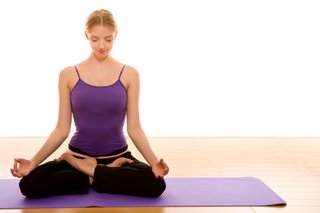 zen mediation space in SF airport Melissa Mizell, design director for Gensler, the architecture firm behind Terminal 2, said in a statement that the room “gives modern travelers a space that fosters and supports quiet and reflection,” MSNBC reports.
adapted from Time Magazine, January 2012
Use our unique “Zen Clock” which functions as a Yoga Timer. It features a long-resonating acoustic chime that brings your meditation or yoga session to a gradual close, preserving the environment of stillness while also acting as an effective time signal. Our Yoga Timer & Clock can be programmed to chime at the end of the meditation or yoga session or periodically throughout the session as a kind of sonic yantra. The beauty and functionality of the Zen Clock/Timer makes it a meditation tool that can actually help you “make time” for meditation in your life. Bring yourself back to balance.
Now & Zen’s Yoga Timer Shop
 Yoga Timer and Alarm Clock Shop - Boulder, CO 1638 Pearl Street
Boulder, CO 80302
(800) 779-6383
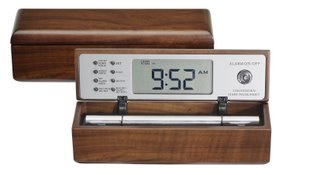 zen chime alarm clock and meditation timers
Posted in Bamboo Chime Clocks, Chime Alarm Clocks, Well-being, yoga, Yoga Timer
 It's exquisite sounds summon your consciousness out of your meditative state with a series of subtle gongs. Trying to not think about falling asleep only creates stress for troubled sleepers. And the more stress, the less chance of falling into slumber. An ancient Kundalini yoga relaxation technique can give your mind something else to focus on and, in turn, help you relax.
Nancy Elkes, an instructor at Practice Yoga in Manhattan, recommends using the Meditation on the White Swan (also called Hunsani meditation) to quiet the mind in order to fall asleep. The more you use it before bed, the more accustomed your body becomes to this process of physically settling down. Once it’s part of your routine, it can soothe your entire body to fall asleep faster.
Meditation on the White Swan
1. Sit in a comfortable seat with a straight spine. Fold your fingers into your palms with the thumbs extended. Press your thumb tips together until they turn white (no need to press hard, just firmly). The tips are facing down in a V-shape to keep the joint relaxed.
2. Place your hands 6 to 8 inches in front of the brow point, with the backs of the hands facing you. Fix your eyes on the white of your thumb tips and get a clear mental image of your thumbs.
 Wake up with gradual, beautiful acoustic chimes. The Zen Alarm Clock transforms your mornings and gets you started right, with a progressive awakening 3. Then close your eyes and clearly “see” the thumb tips through the eyelids mentally.
4. Let the mind meditate on the sound “Sat” (Sanskrit for “truth”) as you inhale, and think “Nam” (meaning “the expression of your truth”) as you exhale. Let the mental sound vibrate in your body and continue for 5-11 minutes.
5. Give yourself over to the sleep gods as you let go. “You will reach a state of complete relaxation when you surrender all the mind’s busy thoughts and all of the body’s tensions over to someone or something else,” Elkes says. “Even if you have to envision your thoughts and aches or tension being swallowed up in the waves, let them flow away from you.”
6. To finish, touch the tongue to the roof of the mouth, gently swallow, softly float your eyes open and lay down for a deep sleep.
You can also try this lying down. You might find that soon after envisioning your thumbs, your alarm is waking you up.
Boulder, Colorado—an innovative company has taken one of life’s most unpleasant experiences (being startled awake by your alarm clock early Monday morning), and transformed it into something to actually look forward to. “The Zen Alarm Clock,” uses soothing acoustic chimes that awaken users gently and gradually, making waking up a real pleasure. Rather than an artificial recorded sound played through a speaker, the Zen Clock features an alloy chime bar similar to a wind chime. When the clock’s alarm is triggered, its chime produces a long-resonating, beautiful acoustic tone reminiscent of a temple gong. Then, as the ring tone gradually fades away, the clock remains silent until it automatically strikes again three minutes later. The frequency of the chime strikes gradually increase over ten-minutes, eventually striking every five seconds, so they are guaranteed to wake up even the heaviest sleeper. This gentle, ten-minute “progressive awakening” leaves users feeling less groggy, and even helps with dream recall.
What makes this gentle awakening experience so exquisite is the sound of the natural acoustic chime, which has been tuned to produce the same tones as the tuning forks used by musical therapists. According to the product’s inventor, Steve McIntosh, “once you experience this way of being gradually awakened with beautiful acoustic tones, no other alarm clock will ever do.”
adapted from Women’s Health Magazine, by BY KRISTEN DOLLARD
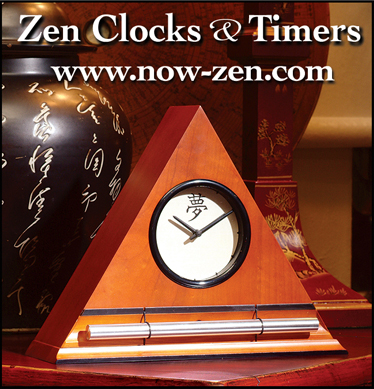 It serves as the perfect meditation timer. Now & Zen – The Gentle Chime Alarm Clocks & Timer Store
1638 Pearl Street
Boulder, CO 80302
(800) 779-6383
Orders@now-zen.com
Posted in Bamboo Chime Clocks
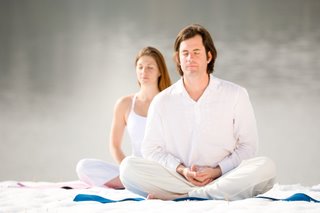 meditation calms the mindmeditation calms the mind Wave Change
Even people meditating for the first time will register a decrease in beta waves, a sign that the cortex is not processing information as actively as usual. After their first 20-minute session, patients show a marked decrease in beta-wave activity, shown in bright colors, top.
BEFORE meditation –Frontal lobe –Parietal lobe –Occipital lobe
AFTER meditation –Frontal lobe –Parietal lobe –Occipital lobe
Inside the Meditating Brain
Frontal lobe This is the most highly evolved part of the brain, responsible for reasoning, planning, emotions and self-conscious awareness. During meditation, the frontal cortex tends to go offline.
Parietal lobe This part of the brain processes sensory information about the surrounding world, orienting you in time and space. During meditation, activity in the parietal lobe slows down.
Thalamus The gatekeeper for the senses, this organ focuses your attention by funneling some sensory data deeper into the brain and stopping other signals in their tracks. Meditation reduces the flow of incoming information to a trickle.
Reticular formation As the brain’s sentry, this structure receives incoming stimuli and puts the brain on alert, ready to respond. Meditating dials back the arousal signal.
Meditation Training
 meditation training After training in meditation for eight weeks, subjects show a pronounced change in brain-wave patterns, shifting from the alpha waves of aroused, conscious thought to the theta waves that dominate the brain during periods of deep relaxation
Relaxation increases… Power of theta waves as a percentage of total EEG power –Meditation group –Control group –Sessions
…conscious thought decreases Power of alpha waves as a percentage of total EEG power –Meditation group –Control group –Sessions
Source: Dr. Gregg Jacobs, Harvard Medical School, author of The Ancestral Mind.
adapted from Time Magazine, Aug. 2003
Use our unique “Zen Clock” which functions as a Yoga Timer. It features a long-resonating acoustic chime that brings your meditation or yoga session to a gradual close, preserving the environment of stillness while also acting as an effective time signal. Our Yoga Timer & Clock can be programmed to chime at the end of the meditation or yoga session or periodically throughout the session as a kind of sonic yantra. The beauty and functionality of the Zen Clock/Timer makes it a meditation tool that can actually help you “make time” for meditation in your life. Bring yourself back to balance.
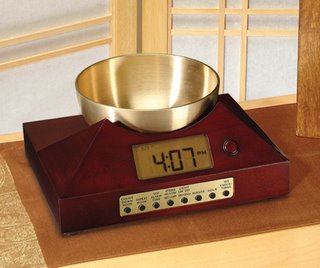 meditation timers with singing bowl chime Now & Zen’s Meditation and Yoga Timer Shop
1638 Pearl Street
Boulder, CO 80302
(800) 779-6383
Posted in Bamboo Chime Clocks, Well-being
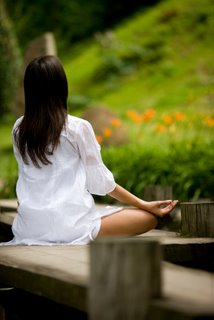 meditation Science has proven that meditating actually restructures your brain and can train it to concentrate, feel greater compassion, cope with stress, and more. Read the latest research and put it into practice.
Yoga citta vritti nirodhah. Yoga is the ending of disturbances of the mind. (Yoga Sutra, I.2)
Nothing is quite as satisfying as a yoga practice that’s filled with movement. Whether you prefer an intense and sweaty vinyasa practice, a gentle but deliberate Viniyoga practice, or something in between, all systems of hatha yoga provide a contented afterglow for the same reason: You sync your movement with your breath. When you do, your mind stops its obsessive churning and begins to slow down. Your attention turns from your endless to-do list toward the rhythm of your breath, and you feel more peaceful than you did before you began your practice.
For many of us, accessing that same settled, contented state is more difficult to do in meditation. It’s not easy to watch the mind reveal its worries, its self-criticism, or its old memories. Meditation requires patience and—even more challenging for most Westerners—time. So, why would you put yourself through the struggle?
Quite simply, meditation can profoundly alter your experience of life. Thousands of years ago the sage Patanjali, who compiled the Yoga Sutra, and the Buddha both promised that meditation could eliminate the suffering caused by an untamed mind. They taught their students to cultivate focused attention, compassion, and joy. And they believed that it was possible to change one’s mental powers and emotional patterns by regularly experiencing meditative states. Those are hefty promises.
But these days, you don’t have to take their word for it. Western scien-tists are testing the wisdom of the masters, using new technology that allows researchers to study how meditation in-fluences the brain.
The current findings are exciting enough to encourage even the most resistant yogis to sit down on the cushion: They suggest that meditation—even in small doses—can profoundly influence your experience of the world by remodeling the physical structure of your brain.
Our Zen Timepiece’s acoustic 6-inch brass bowl-gong clock is the world’s ultimate alarm clock, practice timer, and “mindfulness bell.”
It fills your environment with beautifully complex tones whenever it strikes. In the morning, its exquisite sounds summon your consciousness into awakening with a series of subtle gongs that provide an elegant beginning to your day. Once you experience the Zen Timepiece’s progressive awakening, you’ll never want to wake up any other way. It also serves as the perfect meditation timer.
adapted from Yoga Journal, By Kelly McGonigal
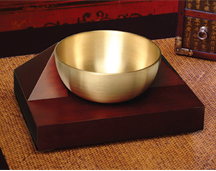 Meditation Timers with Tibetan-Singing Bowls Now & Zen
1638 Pearl Street
Boulder, CO 80302
(800) 779-6383
Posted in Bamboo Chime Clocks, Chime Alarm Clocks, intention, Meditation Timers, Meditation Tools, mindfulness practice, Now & Zen Alarm Clocks, Zen Timers
 Wake up with gradual, beautiful acoustic chimes. The Zen Alarm Clock transforms your mornings and gets you started right, with a progressive awakening Driven to sleeplessness by the effects of stress and the demands of their own biology, women are more likely than men to have serious sleep problems, experts say.
“We see insomnia much more frequently in women, probably at least 50 percent more often than men,” said Dr. Ryan Hays, an assistant professor of neurology at the University of Texas Southwestern Medical Center in Dallas.
In response, women have turned to medication for help. In the age range most affected by insomnia, ages 40 to 59, nearly 15.5 million American women got a prescription last year to help them sleep — nearly double the rate for men in the same age group, according to IMS Health, a health-care consulting firm in Danbury, Conn.
But sleep researchers believe there’s a better way. Changes to a person’s lifestyle and to the way they approach sleep can help in a more natural and more effective way than simply popping a sleeping pill.
And putting away the pills may be especially appealing in light of a report earlier this week in the journal BMJ Open that suggested prescription sleep aids may shorten your life or increase your risk of certain cancers.
“That’s the ideal, to not rely on a pill to help you get to sleep,” said Shelby Harris, director of the behavioral sleep medicine program in the Sleep-Wake Disorders Center at Montefiore Medical Center in New York City. “It’s always best to solve a problem without a pill. It really does depend on the patient, but we prefer if you can avoid medication.”
Two major factors make women more likely than men to suffer insomnia, Harris said.
The first factor is innate and ancient. “There are a lot of hormonal and biological changes throughout the life cycle that women experience, and those affect sleep,” she said.
These hormonal changes begin with menstruation and continue through menopause. Pregnancy also can hamper sleep, particularly in the third trimester, and many women find it very difficult in the first few post-partum months to maintain a deep, healthy slumber. “Every little noise keeps you awake or wakes you up,” Harris said, tracing the phenomenon back to evolution and a hypervigilance developed by our primitive ancestors to better protect their young.
But the second factor is external and modern. Much is required of women these days, as they juggle many different life roles, and the stress this creates can make it difficult to sleep, Harris said.
 Waking up in the morning should be as pleasant as falling asleep at night. The Zen Alarm Clock's gradual, gentle awakening is transformative. “It always seems like they’re trying to fit a 30-hour day into 24 hours,” she said. “There’s little time for moms in particular to relax and unwind, to be able to go to sleep at night.”
These problems can create a vicious cycle, where a woman who has trouble sleeping will begin to fret, which makes it even more difficult to sleep, Hays said.
“Patients often feel if they don’t get a good night’s sleep, the day after is going to be the worst,” he said. “They start to learn to dread the bed.”
Hays and Harris both recommend that their patients adopt changes in their routine to help them get better sleep. These behavior modifications go beyond the usual “sleep hygiene” recommendations — like getting to bed on time every night, partaking in regular exercise or using your bed only for sleep or sex.
For example, many women with insomnia will lie in bed thinking about all the things they need to get done the next day, Harris said. She recommends that these women write up a to-do list early in the evening and then prioritize it. “Write everything out, so it’s on paper and out of your head,” she said.
Other women wake up in the middle of the night and decide to get some work done or perform some chores, which sounds like a good use of time but might be making matters worse, Harris noted.
“If you do that every night at 3:00 in the morning, you’re just training your body to get up and do work at that hour,” she said.
The two sleep experts also recommend that women get out of bed if they wake up in the middle of the night and can’t get back to sleep within a half-hour or so. But instead of working, they recommend that women do something calming, monotonous or even boring: fold clothing, or read old magazines or books in dim light.
“They’re better able to fall back asleep quicker than if they stayed in bed and became frustrated,” Hays said.
Women with extreme insomnia might even consider trying a counter-intuitive approach in which they limit their time in bed, Hays said. If they’re only getting five hours of good sleep a night, for instance, they could allow themselves only four hours in bed.
“If they spend less time in bed, there’s a better chance they’ll spend more of that time sleeping,” Hays said.
Another little sleep trick involves body temperature. Researchers have found that sleep comes with a drop in a person’s core temperature, Hays noted. Taking a relaxing warm bath before bedtime could help aid sleep. “That may increase the amount the body’s temperature actually drops, which may help sleep continuity,” he explained.
Finally, women can help themselves fall asleep by “setting the table” for sleep by adopting a routine set of relaxing rituals just before bedtime.
“A lot of people treat sleep like an on/off switch,” Harris said. “You should set aside a half-hour to treat sleep like a dimmer switch.” Sit in a favorite chair, dim the lights and do something relaxing and enjoyable.
“You’re setting the stage for sleep,” she said. “Then get in bed when you’re actually sleepy.”
Our Zen Timepiece’s acoustic 6-inch brass bowl-gong clock is the world’s ultimate alarm clock, practice timer, and “mindfulness bell.”
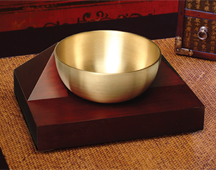 Wake up with gradual, beautiful acoustic chimes. The Zen Alarm Clock transforms your mornings and gets you started right, with a progressive awakening It fills your environment with beautifully complex tones whenever it strikes. In the morning, its exquisite sounds summon your consciousness into awakening with a series of subtle gongs that provide an elegant beginning to your day. Once you experience the Zen Timepiece’s progressive awakening, you’ll never want to wake up any other way. It also serves as the perfect meditation timer. Available in 5 wood styles, including bamboo (shown).
More information
The U.S. Centers for Disease Control and Prevention has more on sleep and sleep disorders.
 The Zen Alarm Clock transforms mornings, awakening you gradually with a series of gentle acoustic chimes Once you use a Zen Clock nothing else will do Now & Zen – The Zen Alarm Clock Store
1638 Pearl Street
Boulder, CO 80302
(800)779-6383
Orders@now-zen.com
Posted in Bamboo Chime Clocks
« Previous Page — « Previous Entries
Next Entries » — Next Page »
|
|
|
|